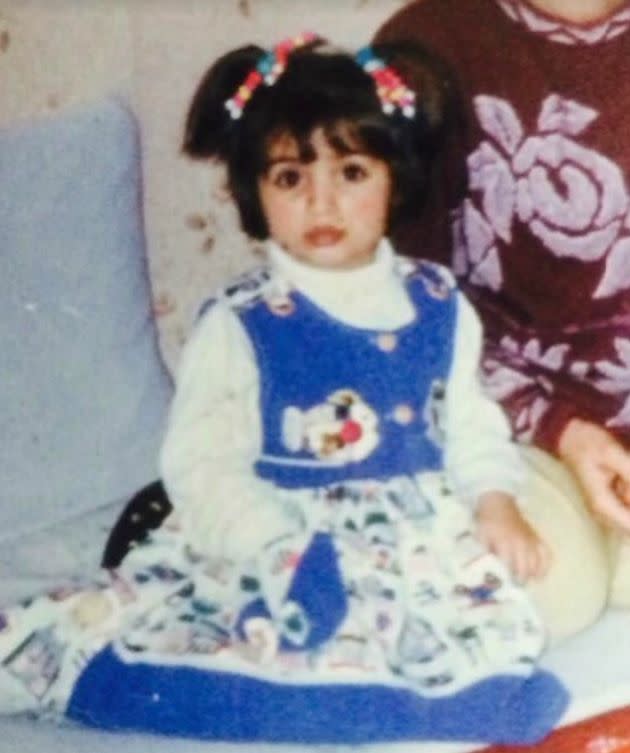I Went To A Secret Underground School For Girls In Afghanistan. It's Happening Again.

The author as a child in Dushanbe, Tajikistan.
I grew up in Afghanistan in the late 1990s, a time when the Taliban interpreted and controlled what it meant to be a female. Their laws, combined with the cultural constraints, sought to suppress equality through any means necessary.
As young girls in Afghanistan, my sister and I could not attend school. Such an act was illegal, and carried a brutal punishment if discovered. Every morning we watched as our brothers carried their backpacks off to school, while we sat obediently at home and prepared meals for them.
Our misery did not go unnoticed by our parents. My brave mother hoped for a different world for me than the one she knew, and when I turned 7, she wrapped my books in grocery bags, dressed me in my brothers’ clothing and sent me to an underground secret school for girls.
The school was in the basement of a building covered in black curtains, hidden from the outside world. The doors and windows of the basement were chained with a lock to prevent entry. Our teacher was a former college student who taught Farsi, and my own mother took the role of a teacher occasionally.
The basement became a refuge for more than 50 girls who risked their lives each day in pursuit of education. There were no desks or chairs in the basement, so we all sat in a circle to learn.
Though the lessons I learned were important to me, I lived each day in fear of brutal punishment ― even death. Every morning, my sister and I took a different route to join classes at different times, so as not to create patterns. The possibility of being discovered by the Taliban was very high.
My mother’s persistent bravery was our beacon of hope. “Women with books are powerful,” she would remind us before we stepped out the door and beyond the safety of our home.
As I made my way through the busy streets, I felt empowered by her words. My mother saw something good in me, and she knew that despite all the terror around us, the best future she could give me would involve my gaining knowledge.
As the conditions for women worsened in Afghanistan, my parents decided this was not an environment in which they wanted to raise their young family ― especially their daughters. With only $2 in their pockets and four children, they left the only life they had ever known. As an 8-year-old, I became a child refugee and lived in a camp at the border of Tajikistan. There, I witnessed the worst humanitarian crises: children dying from diseases, poverty, lack of school, no electricity, lack of medical facilities and no sanitation.
After spending several years at the camp, we found our asylum outside of a camp in Tajikistan and then Uzbekistan, where we spent several years as immigrants. In 2005, my family registered with the U.N. Refugee Agency. In 2009, my family and two others, out of 40 families in all, were approved to come to the United States. I was 13 years old.
Our life changed. In America, I knew that I was one of the lucky ones. As a result, I recognized my role as an agent of change early on. Three years later, I founded my own organization called Enhancing Children’s Lives, a foundation dedicated to providing access to education, advocacy, medical care and nourishment to low-income children in my own Richmond, Virginia, community and internationally.
Through my foundation, I opened a women’s library and bookstore in Afghanistan, where I was able to extend literacy to more than 6,000 Afghan women and secure the education of 1,700 girls globally. Within my own community, I volunteered in homeless shelters and juvenile detention centers, and advocated on a policy level at United Nations organizations.

The lessons I learned as a young girl growing up under the oppressive Taliban regime are many. In the face of oppression, I learned the importance of advocacy, equality and the power of education, all which inspired me to choose a career as a human rights lawyer.
Today, as I watch the Taliban take over my country again and ban the education of older girls, I am haunted by my childhood memories. As I witness schoolgirls being asked to make a U-turn back home, I think of my own perilous journey walking to an underground secret school. As I see families desperately fleeing Afghanistan for safety, I recall my own family’s treacherous journey to escape. It is heart-wrenching to witness my homeland returning to the dark days.
Even amid the great difficulties, I remain committed to my fight for the education of Afghan women. To the world, I say: Please do not close your eyes to the condition of women in Afghanistan, who have suffered enough. I ask that we come together and stand in solidarity with Afghan women and advocate for their education.
One lesson remains at the forefront: No woman should be denied their basic right to an education.
Do you have a compelling personal story you’d like to see published on HuffPost? Find out what we’re looking for here and send us a pitch.